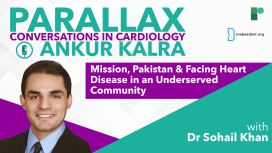
Dr Dipti Itchhaporia, 70th President of the American College of Cardiology (ACC), always met her fears with actions. One of her motivations to become a cardiologist was to be able to act in the face of acute situations. When Dr Itchhaporia, the fifth woman and the first of South Asian descent to fill in this position, was asked to summarise her presidential year, she answered: flourishing in opposition of languishing.
Dr Ankur Kalra’s guest in this episode of Parallax is Dr Dipti Itchhaporia, ACC Immediate-Past President, an interventional cardiologist and the Eric and Sheila Samson Endowed Chair in Cardiovascular Health, director of disease management for Hoag Heart and Vascular Institute, and associate professor at the University of California, School of Medicine.
In this personal interview, Dr Itchhaporia recalls her early years and the influences and decisions that led her to medicine and cardiology. She talks about her connection to ACC and the importance of choosing a professional home where one can find their purpose under the mentorship of their community. Ankur asks Dr Itchhaporia about the most memorable moments of her presidency. They talk about South Asian identity and curbing CVD in this population.
How does Dr Itchhaporia think about representation and the meaning of her historical position at ACC? What is Dr Itchhaporia’s message to women in cardiology?
Questions and comments can be sent to “podcast@radcliffe-group.com” and may be answered by Ankur in the next episode. Guest, @ditchhaporia hosted by @AnkurKalraMD. Produced by @RadcliffeCARDIO.

Dr Khan talks about education in the US and his decision to move back to Pakistan. Ankur asks Sohail about his new professional home: NICVD, a free clinic providing primary heartcare for Pakistanis. They discuss some of the innovations Dr Khan works on to improve patient care that utilise simple but effective interventions. We learn more about free screening clinics and about Dr Khan’s work on the largest ever study in Pakistan on association of Lpa and CV disease in South Asians.


The charity organisation, Women as One is an agent for women and men to be part of medicine that is built on talent, rather than a privilege. Roxana and Ankur discuss the role of mentorship and family-friendly work environment in mending the broken house of cardiology. Roxana talks about the practical tools that are available for women to take the next steps in their career and achieve their goals.

Dr Kalra asks Dr Mauri about early influences and her traineeship with legendary interventionalists, the late Donald Baim and Richard Kuntz. Dr Mauri talks openly about her decision-making process and the importance of selecting your priorities and committing to them. Ankur asks Laura about her decision to go into industry. Laura shares her thoughts on medical innovations and meeting urgent needs with unique perspectives.
What is Dr Mauri’s advice for a young cardiologist? How did she balance research and patient care? What are the questions that helped her decision making? How does Dr Mauri think about innovations in medicine?

Brigham and Women’s Hospital’s Health Equity Committee decided to confront the status quo by asking: How is racism on a structural level present within our walls?
Ankur Kalra’s guests Michelle Morse (Founding Co-Director of EqualHealth and Assistant Professor at Harvard Medical School) and Lauren Eberly (Cardiology Fellow at the University of Pennsylvania) are co-authors of a retrospective study that demonstrated what had previously only been observed: That black or brown heart failure patients ended up in general medicine rather than specialised cardiology services. Following the publication of the study in November 2019, the Health Equity Committee started to roll out anti-racism trainings and to work on objective admission guidelines to mitigate biased behaviours.
Aarti Bhatt (Assistant Professor of Medicine at the University of Minnesota), member of the Minnesota chapter of Campaign Against Racism, talks about their initiative to support projects that have a positive impact on local communities on a global scale.

In this week’s Parallax, Dr Kanaa’N, the director of the program, and Dr Lahorra, chairman of the Heart, Vascular & Thoracic Department of Akron General introduce the listeners to the foundations of their program and the paradigm shift brought by TAVR.

Ankur Kalra asks Grant W Reed, Director of the Cleveland Clinic’s STEMI program, to reflect on the actions they took and the challenges of delaying cardiovascular procedures in the wake of the coronavirus pandemic. Dr Reed offers insight on the factors that influenced the Cleveland Clinic’s STEMI policy for COVID-19. Ankur and Grant discuss the triage considerations for patients with structural heart disease and the steps the clinic took to protect its healthcare workers.





